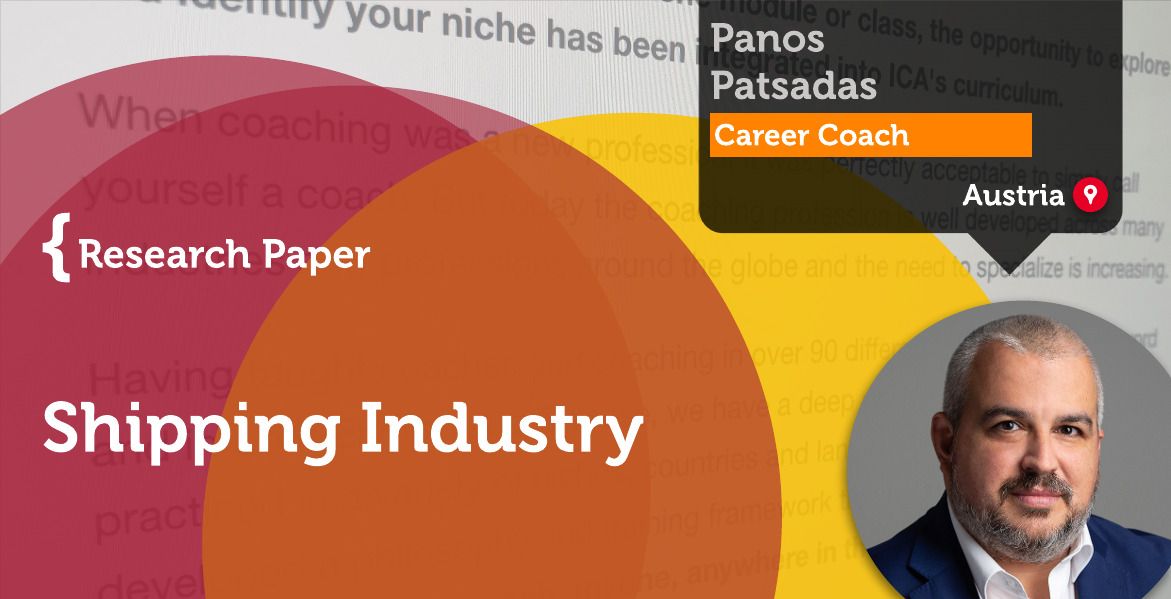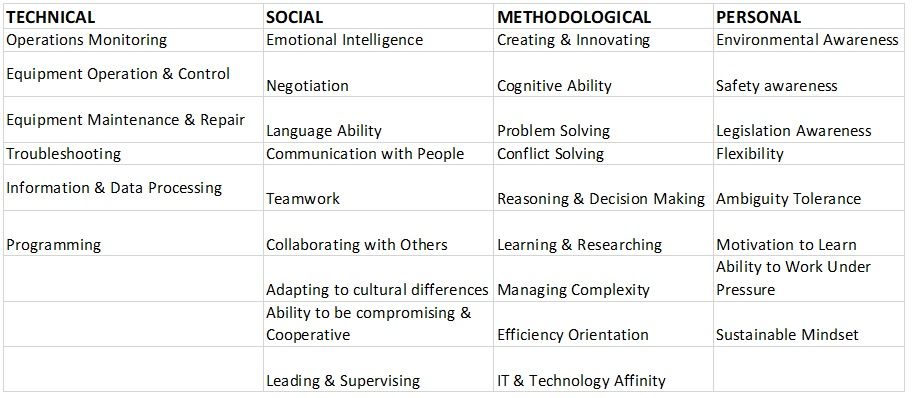A Research Paper By Panos Patsadas, Career Coach, AUSTRIA

Shipping Industry Career Development
 The shipping industry differs in many ways from other businesses, in the sense that insight into factors or skills that make a successful shipping professional is limited, and much of one’s success is dependent on the experience one gains through years of practice. This is not to say that there aren’t academic courses, degrees[1], or qualifications[2] out there that one can attend and gain formal recognition, but rather that such recognition plays a very little role in one’s career development or even career commencement. An oversupply of candidates in recent years, with similar academic backgrounds, and professional accreditations before they even had one day on the job, makes HR managers evermore skeptical when reviewing CVs or evaluating candidates. It also puts candidates in the trap of mimicking their peers, which prevents them from standing out in the job market. The bottom line remains that, although there is plenty of training available, there is very little research in regards to the skills required, that could help one break to ship and enjoy a successful career or develop from their present role to a leadership position.
The shipping industry differs in many ways from other businesses, in the sense that insight into factors or skills that make a successful shipping professional is limited, and much of one’s success is dependent on the experience one gains through years of practice. This is not to say that there aren’t academic courses, degrees[1], or qualifications[2] out there that one can attend and gain formal recognition, but rather that such recognition plays a very little role in one’s career development or even career commencement. An oversupply of candidates in recent years, with similar academic backgrounds, and professional accreditations before they even had one day on the job, makes HR managers evermore skeptical when reviewing CVs or evaluating candidates. It also puts candidates in the trap of mimicking their peers, which prevents them from standing out in the job market. The bottom line remains that, although there is plenty of training available, there is very little research in regards to the skills required, that could help one break to ship and enjoy a successful career or develop from their present role to a leadership position.
Beginning of a Shore Career in Shipping Industry
Shipping is considered to be one of these very closed professions, that is either kept within the family or is a hereditary right of those born in it. Outsiders are often met with considerable skepticism from the inside. In an article I wrote discussing the same a couple of years ago, four main determinants make a gateway into shipping.
- a) Connections
- a) Seafaring or “on the job” experience
- c) Luck
- d) Academic Qualifications
The 2 key determinants, Connections, and Seafaring (or on-the-job experience) are completely unrelated to academic qualifications or background and have solely to do with soft skills. These skills are what help create connections, help maintain a network and forge alliances. Creating connections is critical throughout one’s career but for shipping in particular it can make all the difference between entering the business or being kept out. Yet soft skills are the least considered by candidates who put all their resources and efforts into obtaining academic and professional qualifications. And this is only part of the story. The other group of candidates is the ones who are transitioning from a sea-going career to a shore-based one. In a report of the SKILLSEA [3]project (co-founded by the European Union), one of the three areas this report is addressing is “Improving Seafarers’ Soft Skills in leadership and management with new training Programmes”.
Transition From Core to Soft Skills
Both types of candidates, i.e. new entrants and sea personnel looking to come ashore, will need to shift perspective to gain the necessary leadership skills needed for today’s shipping. The current approach for new entrants is to choose the desired role, and then try to collect as many qualifications as possible to render themselves relevant for the role. This is a task-based approach. The industry however in various publications talks about the requirement of new skill sets and identifies certain soft skills to be the ones in demand-need in following years. Coaching can very effectively bridge this requirement for a shift in perspective, and the creation of awareness. The questions what, why, how which a coach can bring to the table, can help raise a candidate’s awareness, not necessarily of what is required, but the fact that there is another way to look at the job-hunting process, or look beyond the surface. Only when a candidate is aware, that one or more of the future requirements of the Shipping Industry align with the part of their skill set, will they be ready to consider a new approach to job hunting. For the more seasoned professionals looking to come ashore, the use of coaching can have a much bigger impact on them having a successful career. While a young candidate, without knowledge of the industry but mere an outsider’s perception, may be easier to introduce to a new perspective, the same may not be as easy for a seasoned seafarer looking to come ashore. Work on board a vessel is very much based on vertically integrated hierarchy, authoritarian and strict process diagrams. The role and tasks are very much set in stone. In this group of candidates, creating the soft skills of empathy, active listening, inspiring, and leading, can be even more difficult. Shifting the perspective of a client from being a member of a vertically integrated system to being part of a flat or horizontally integrated office environment can be challenging. It will require invoking awareness, which is a critical part of coaching, and then slowly introducing to the client certain skill sets that will align their interaction within the new environment.
Industry Evidence That Coaching Can Be Effective in Shipping
In the research paper by Haughton Maritime in 2007, titled “Coaching for Seafarers”[4], the UK Maritime Coastguard Agency was asked if Coaching should be used for Sea Going personnel. The reply was asf:
The MCA publication drives home the Crucial importance of developing so called “soft skills” in support of a positive safety culture. It argues that an awareness and use of these skills is linked inextricably with the striving towards Safer Lives, Safer Ships and Cleaner Seas.
In a Survey published in 2019 by Faststream Recruitment Group[5], one of the world’s leading Maritime Recruitment Agencies for Sea and Shore-based personnel, over 2000 Senior Maritime Executives from across the world were surveyed on their views and thoughts on Future Talent, Leadership, Career Development. One of the questions asked was “what matters most to you at work” and was shared with both employers and employees. The results of the pole were astonishing, and clearly, the things that matter most to employees are some of the headline subjects we as coaches are asked to assist our clients with. The findings were asf:

We can see quite evidently from the table, that work-life balance and career progression are at the higher end of employee responses. These are two areas which “we” as coaches are very often asked to assist our clients with, and thus we can attest by own experience, to the value coaching can contribute to one’s work-life balance and career progression particular at this point where the industry is going through a vast transformation.
Coaching First Time Job-Seeker in the Shipping Industry
It is one task coaching someone already in the industry, and a different task altogether coaching someone wishing to enter the industry. So far in this research piece, we have established that soft skills will be in high demand in shipping for the next ten years. We have also established how coaching can assist professionals to gain awareness, develop soft skills, such as listening, leadership, empathy, teamwork, and help them transition in the workplace or move up the career ladder. The other category is a first-time Job Seeker, and how coaching can help them not just land their first job, but also land a job in the right area of shipping. Both categories are within my Niche, which is to assist seasoned professionals in Shipping to advance their careers but also help young professionals wishing to pursue a career in Shipping. As far as the seasoned professionals are concerned, an approach of pure coaching can be followed, since they are already working in the industry and have to a lesser or greater extent awareness and knowledge of the different areas. In the case of the newcomers, coaching with an element of mentoring can help greatly in making the right decision and achieving their goals. In fact, in a research paper published by Sue Smith[6]for the International Journal of evidence-based Coaching and Mentoring (Using a blended style of coaching 2017), a Survey Questionnaire was sent to 135 clients who had completed a coaching program. The result of the survey was reported as:
A blended style of coaching and counselling achieved the most highly rated blended style when applied by internal coaches; perceived to be as effective as pure coaching in terms of achieving objectives.
So in terms of a client being a potential candidate for entering the Shipping industry, there is evidence to suggest that mentoring, to broaden the client’s perspective, can have equally good results as pure coaching.
Perception vs. Reality
One of the fundamental flaws of shipping, as mentioned at the beginning of this project is that it is a closed business, and getting accurate date information from the outside can be a daunting experience. A lot of young candidates, chart their course based on perception, peer influence, and what they hear, without really having a clear picture of what to expect. Especially when it comes to money. This is something very clearly highlighted in Faststream’s Survey[7]“Perception Vs Reality Careers at Sea and Ashore”, where the findings of a survey consisting of more than 2000 participants including 821 serving mariners, indicated a big gap between perception and reality among participants, in terms of Salary per role (technical vs Commercial), ease of finding employment (by role and geographical area). So coaching in combination with mentoring can help address this gap and help clients make decisions on reality and not perception.
This is something I explored 5 years ago in my article
Becoming a shipbroker when everyone aspires to one day be a Shipowner”[8]
which was republished by multiple journals and Maritime Magazines. The engagement and response triggered by young candidates looking to find their way into shipping, was also what gave birth to my Niche. The only part of mentoring involved is to understand the candidates’ perception of the area of Shipping they would be interested to work in and try to give them as clear a picture as possible of that area. In addition, if I sense a candidate has very limited exposure to Shipping, present them with all possible areas one can pursue, before commencing the coaching process. Each client has different expectations, and some clients may come determined to discuss/explore only one area of shipping. Coaching can help a client explore their expectations from being successful in their quest, and by identifying that, help them explore how their values and skill-set align with the requirements of the job. Other clients, have zero exposure and looking for guidance. In this case, the Coaching agreement will be more difficult to establish and may take one session alone, to understand what it is that attracts them to shipping, after presenting them with the various career paths. Once the client has decided, then help them explore what can help them in pursuing this path. The coaching process in this case aims for the client to gain awareness of their values, which more often than not, run in the background. Once we help clients achieve this awareness, the client will be in a better place to make their decision in alignment with their beliefs, and thus will be committed to their goal.
The Shipping Industry Future
The shipping industry, is undergoing a digital transformation, and although is lagging behind other industries, it is catching up fast. This brings the need for new skill sets which previously the industry was trying to cover with competence, yet competence alone is no longer sufficient. In a very interesting paper by the Istanbul Technical University titled “Future Skills Requirements Analysis in Maritime Industry”, the authors are separating the skills required into the 4 following categories and then list the skills

Taking the Technical Skills aside, which is a matter of practical process-based learning, the majority of Social, Methodological, and Personal Skills highlighted, are areas at the forefront of coaching. More specifically Skills such as Teamwork, Collaborating with Others, the Ability to be compromising and cooperate, Cognitive ability, Managing complexity are all skills that coaching can help clients build by shifting the perspective of the person from awareness of the individual to awareness of one as part of a whole. On the other hand, Leading and supervising, which requires empathy, emotional intelligence, is an area where coaching can help the individuals take a step back from the group, and self-reflect on behaviors that may not foster the growth of a leadership mindset.
Shipping Industry and Developments
This short review in terms of the Shipping Industry and developments in required skills has highlighted that development of the industry, and its members will require a strong focus on soft skills. These skills are presently not found within the industry, and at the same time, the industry remains reluctant to import these skills from other sectors, something also supported by recent studies[9]. The value coaching can bring in one’s development within the shipping industry, is to help raise awareness to new entrants or seasoned professionals, and assist in building this skillset. Contextually, seasoned professionals can benefit from Leadership coaching in a new, digital, gender-equal working environment, whereas new entrants, can benefit from shifting their effort from the generic job-hunting approach, and instead try to develop and promote skills the industry needs, as opposed to sticking to the outdated sterile qualification based approach which stems more from perception and less from reality. The view that soft skills are often overlooked by candidates, and coaching could benefit someone looking to enter shipping, has also been shared by PAUL FERDAIS in his article for MARITIME EXECUTIVE in 2017 titled “Everyone can benefit from coaching”[10]. Coaching is, without doubt, a tool missing from Shipping Industry’s s arsenal as it tries to adapt to a rapidly changing environment.
References
Marek Korczynski “Human Resource Management in Service Work” - Macmillan Education UK, 21.11.2001
Field, L. & Mawer, G. “Generic Skill Requirements of High-Performance Workplaces”
Nickson Et al. “Human Resource Management for the Hospitality and Tourism Industry”
V Bastin Jerome, Allegra Antony “Soft Skills for Career Success”
Alan Booth, Joseph Melling “Managing the modern workplace: Productivity, Politics, and Culture”
Sarah de Groo “Work-Life Balance in the Modern Workplace”
Jiangang Fei “Managing Human Resources in the Shipping Industry”
Hirsch S. Ruchlin “Manpower Resources of the U.S. Maritime Industry: A Definitional and Descriptive Analysis of the Maritime Labor Force”
John Dinwoodie “Management Careers and Education in Shipping and Logistics”
[1]Shipping Europe
[2]https://www.edumaritime.net/uk/
[3]https://www.skillsea.eu/images/
[4]www.haughtonmaritime.com/
[5] https://www.faststream.com/
[6] International Journal of Evidence-Based Coaching and Mentoring
[7] https://www.faststream.com/media/
[8] https://www.linkedin.com/pulse
[9] https://www.faststream.com/insights
[10] https://www.maritime-executive.com/